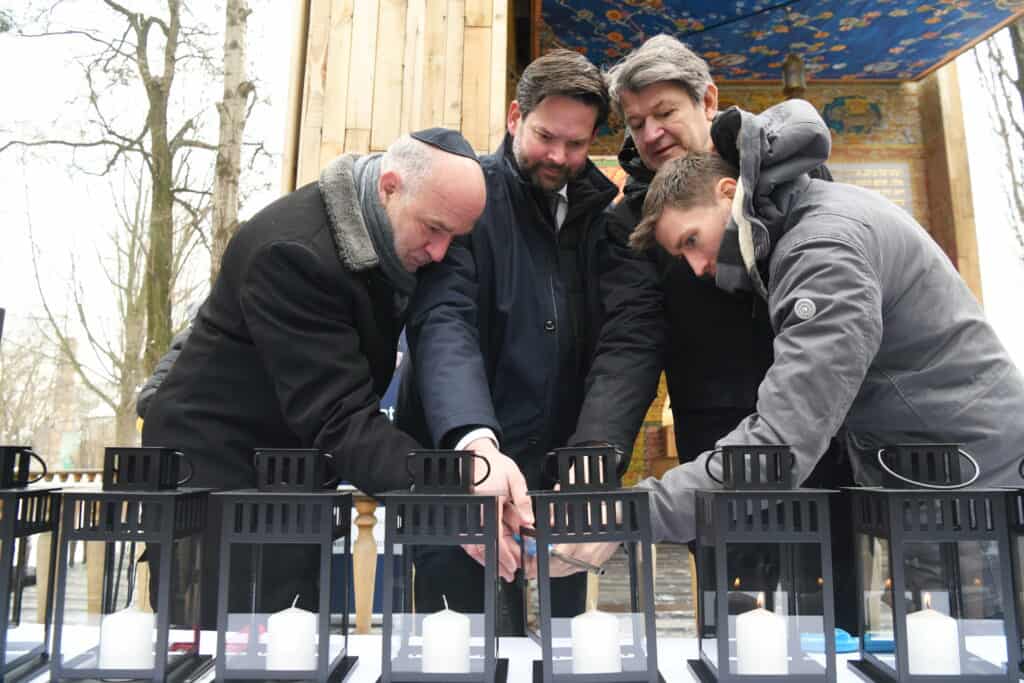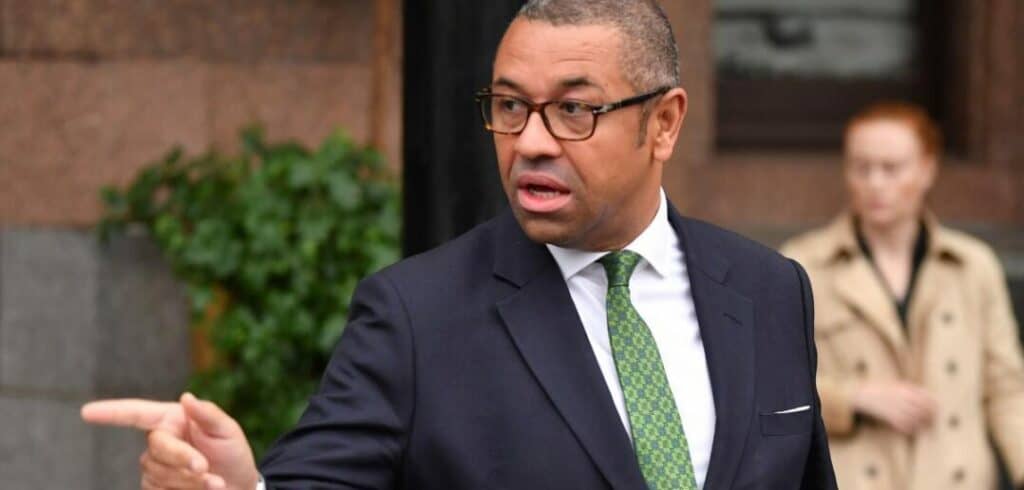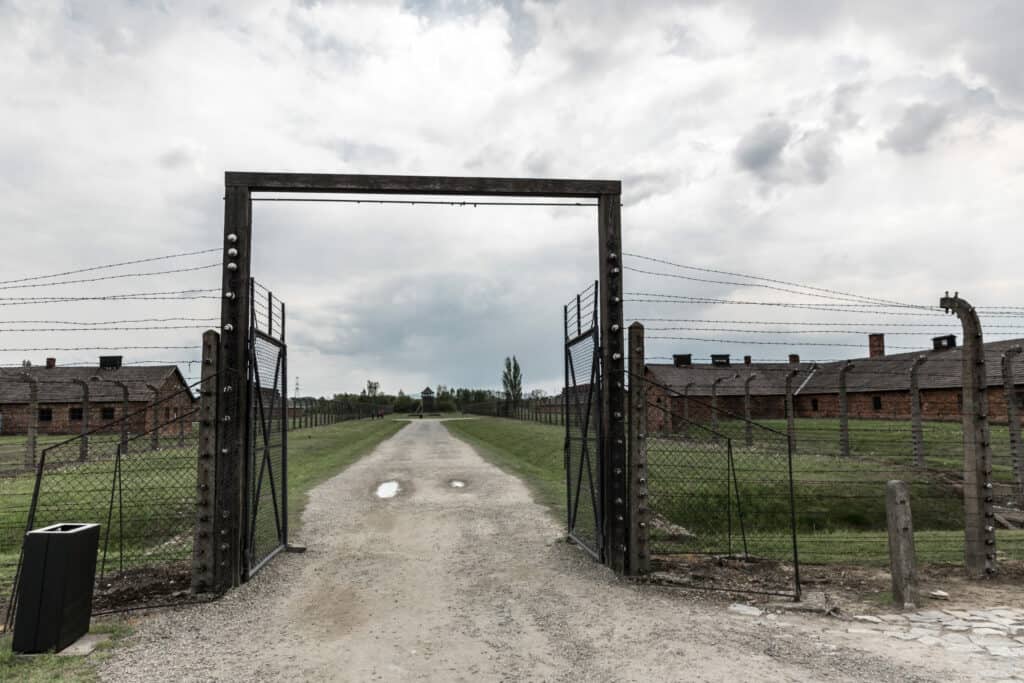“There are more Jews in Europe who think that there will be no more Jewish community here in a decade than those who think that there is still hope,” declared Rabbi Menachem Margolin, Chairman of the European Jewish Association, writes Yossi Lempkowicz.
“I am not saying that in ten years you will not be able to see Jewish people in Europe but I am very worried about the possibility to have Jewish presence in ten years from now,” he added as he addressed 160 ministers, parliamentarians and diplomats from across Europe who gathered for two days in Krakow, Poland, to discuss ways to increase Holocaust education and remembrance, fight against antisemitism and develop tools to combat hate speech and incitement in the age of social networks.
The gathering included also a tour of the Auschwitz-Birkenau death camps where a candle lighting ceremony and wreath laying were held in the presence of Rabbi Meir Lau, former chief Rabbi of Israel and President of the Council of Yad Vashem, the Holocaust Memorial in Jerusalem.
Mehdi Bensaid, Roberta Metsola, European Parliament Vice-President, Hungarian Minister of Science and Education Zoltan Maruzsa, Minister of Education of Rhineland-Palatinate Stefanie Hubig, British Secretary of State for Education Nadhim Zahawi, as well as the Speakers of the Parliaments of Slovenia and Montenegro.
The conference took place on the 83rd anniversary of Kristallnacht, the night of Broken Glass, when on 9 November 1938 the Nazis started the anti-Jewish pogroms by killing Jews, burning 1400 synagogues and destroying shops owned by Jews across Germany and Austria.
“Europe is fighting anti-Semitism, but it is not winning yet. If this upward trend continues, more and more Jews will seek sanctuary in Israel rather than stay in a continent that cannot learn the lessons and cataclysmic mistakes of its past. We are not yet in the state of Judenfrei but, unfortunately we are approaching it,’’ Rabbi Margolin emphasized.
He noted that Jews who seek to eat according to the customs of their religion cannot do so in certain countries because of laws banning kosher slaughter. And in some cities on the continent Jews cannot walk safely in their traditional clothes.
“Education, he said, is the most effective vaccine in combatting the world’s oldest and most virulent virus.”
Addressing the symposium in a video from Jerusalem, Israeli Prime Minister of Israel Naftali Bennett said: “In the Middle Ages Jews were persecuted because of their religion. In the 19th and 20th centuries Jews were reviled because of their race, and today Jews are attacked because of their Nation State, Israel.”
“It is worrying that there needs to be a conference about Anti-Semitism in Auschwitz so soon after the Holocaust,” the Israeli premier said, adding that “so long as Israel remains strong, Jewish people around the world will be strong.”
British Secretary of State for Education Nadhim Zahawi stated that: “The Holocaust was a failure for humanity and justice. The worst event in history. Nothing can erase the pain. I can feel the pain because my whole family has run away from Saddam Hussein’s rule. As Kurds, we had to escape. We fled when I was 7 years old from Iraq to the UK.”
The symposium in Krakow was followed by a visit of the Auschwitz-Birkenau death camps where a candle light ceremony and wreath laying took place.
He added: “I understand the important role of UK teachers in Holocaust education. Learning about history is something we sanctify in the UK. Due to the corona, virtual visits to Auschwitz increased. We have zero tolerance for anti-Semitism and racism. Anti-hate education is our top priority in the UK. I urge universities to adopt the IHRA definition of anti-Semitism,” he said in a reference to antisemitism on campuses.
German Minister of Education of the Rhineland-Palatinate State, Stefanie Hubig said: “I work hard to preserve the memory of the Holocaust in schools. We work to bring teachers to visit memorial sites and promote Jewish education in schools. This is all important because, unfortunately, there are still reasons why we must continue to remember.”
In a message from Rabat, Moroccan Minister of Culture and Youth, Mohamed Mehdi Bensaid, stressed that this conference is taking place at a time when more and more radical ideologies promoting anti-Semitism, Islamophobia and xenophobia are flourishing. “As long as the danger of radicalism hovers over the world, we all have a duty to remind and teach our younger generation in Morocco and around the world about the dark chapter of the Holocaust in human history.”
Kálmán Szalai, secretary of the European Action and Protection League (APL) identified education as an important means of reducing anti-Semitic prejudice and emphasized that “the knowledge passed on to new generations can fundamentally influence the choice of values in adulthood”.
A recent survey by the APL showed the persistence of anti-Jewish prejudices in the population of several countries in Europe.
83 years after Kristallnacht, Jewish leader warns: Europe can become ‘Judenfrei’ in 10 years













